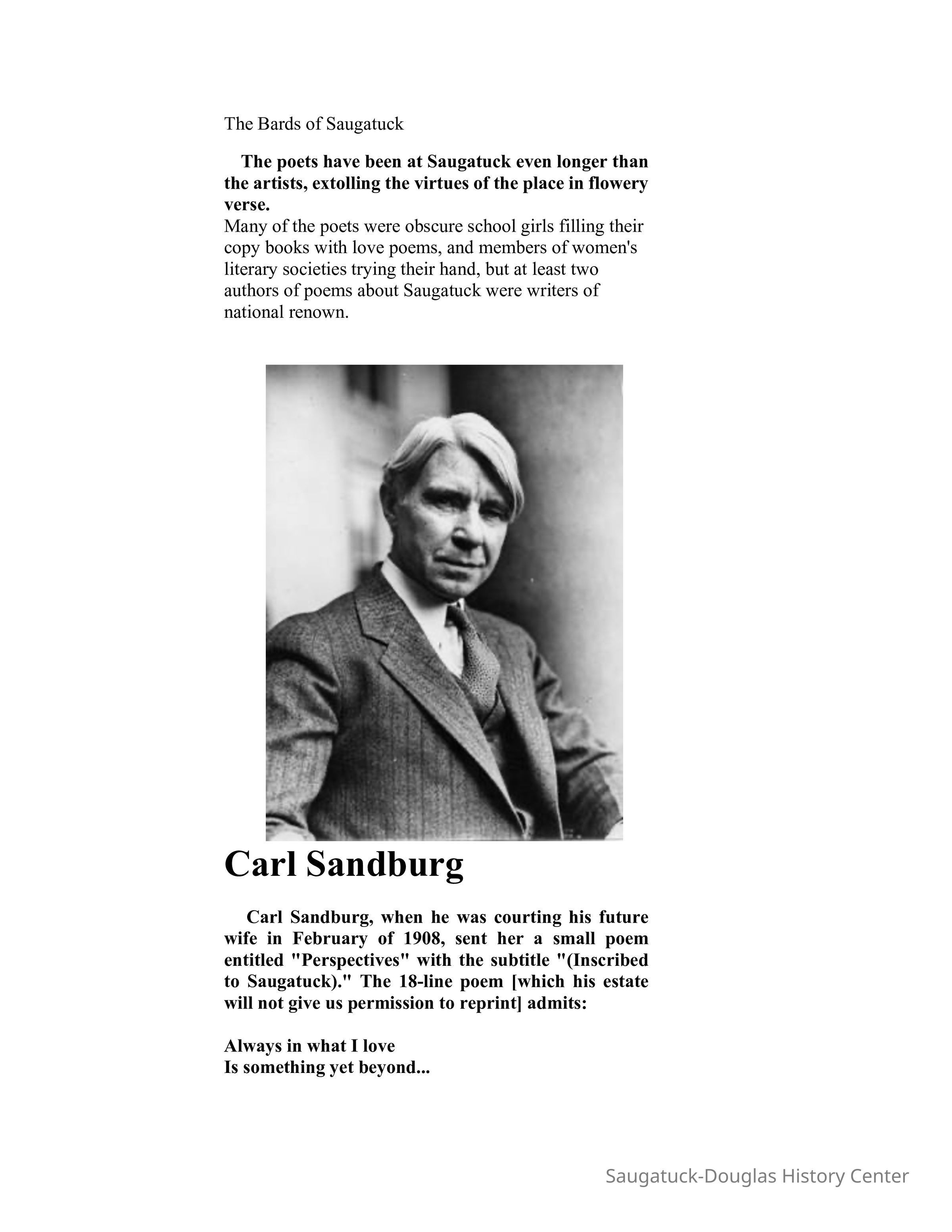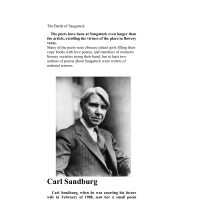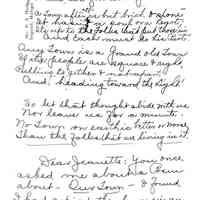Poetry about Saugatuck

2023.50.15
SDHS NL Inserts
Winthers, Sally
Digital data in CatalogIt
Heath, May (Francis) 1873-1961Coutoumanos, George 1876-1962Eddy, Lillian (Grimes) 1863-1955Vander Molen, RobertBoyce, Peggy (Webster) 1932-2021
This information was OCR text scanned from SDHS newsletter supplements. A binder of original paper copies is catalog item 2023.50.01
The Bards of Saugatuck The poets have been at Saugatuck even longer than the artists, extolling the virtues of the place in flowery verse. Many of the poets were obscure school girls filling their copy books with love poems, and members of women's literary societies trying their hand, but at least two authors of poems about Saugatuck were writers of national renown. Carl Sandburg Carl Sandburg, when he was courting his future wife in February of 1908, sent her a small poem entitled "Perspectives" with the subtitle "(Inscribed to Saugatuck)." The 18-line poem [which his estate will not give us permission to reprint] admits: Always in what I love Is something yet beyond... and makes the point that Saugatuck is directly across Lake Michigan from Sandburg's vantage point in Wisconsin. He speaks of the "cool-deep open places" and "somber woodlands" of the opposite shore. Sandburg never published the poem. He considered it part of his "juvenilia" according to his daughter Margaret. It was published in a biography of Mrs. Carl Sandburg written by another daughter, Helga. Edgar Lee Masters The second famous poet to write about the area was Edgar Lee Masters, best known for his Spoon River Anthology. His mother and father, Hardy and Emma Masters, bought a 40 acre farm on the lakeshore south of Saugatuck about 1906. Edgar wrote in his autobiography "My father had become infatuated with the Michigan country. He ran up a flag on his front yard with the device 'Masters Farm,' and though he was now sixty-one he was as young as ever and could pitch hay or chop wood with undiminished vigor. He expected to make money out of his eighty bearing cherry trees, and out of his hundreds of peach trees; but he soon found that the market men in Chicago reaped all the profit in them. His reward consisted, mostly, in looking at Lake Michigan which bordered his frontage, and in swimming in its waters, and in loafing at the country store near at hand, where he became friends with the owner and the farmers about." The Masters farmhouse later became the nucleus of Wavecrest resort and rental cottages. The store was Hillock's store located on, 68th Street, later the Blue Star Highway, almost due east of the Masters property. In 1916 Edgar Lee Masters published a book called Songs and Satires, which included: IN MICHIGAN You wrote: "Come over to Saugatuck And be with me on the warm sand, And under cool beeches and aromatic cedars." And just then no one could do a thing in the city For the lure of far places, and something that tugged At one's heart because of a June sky, And stretches of blue water, And a warm wind blowing from the south. What could I do but take a boat And go to meet you? [The poet describes the restless journey on the boat, the man anxious for the time go quickly until the boat docked.] I took the ferry, I crossed the river, I ran almost through the little batch Of fisherman's shacks. I climbed the winding road of the hill, And dove in a shadowy quiet Of paths of moss and dancing leaves .. . I ran to the top of the bluff Where the lodge-house stood. And there the sunlit lake burst on me And wine-like air... . I plunged, I stumbled, I ran Down the hill... And I shall never forget your cry, Nor how you raised your arms and cried, And laughed when you saw me. [The poem goes on for several pages. The lovers decide too many eyes are watching so she sends the man away, with orders to return that night until the screen of darkness.] I stole through echoless ways, Where no twigs broke and where I heard My heart beat like a watch under a pillow. And the whippoorwills were singing. And the sound of the surf below me Was the sound of silver-poplar leaves In a wind that makes no pause.... I hurried down the steep ravine, To my left was the lighthouse, And black and deep purples far away, And all was still. Till I stood breathless by the tent And heard your whispered welcome, And felt your kiss... . Although the poet had been married in the spring of 1898 he was known in literary and social circles as a womanizer. In the summer of 1909 he was pursuing a woman he calls Deirdre in his autobiography, but whose real name was Tennessee Mitchell. She had grown up in Jackson, Michigan and was a piano tuner, and later teacher, by trade. (After the affair with Masters ended she married another noted author, Sherwood Anderson.) Early in their relationship Tennessee had sent a note to Masters' Chicago office that she was going to Michigan with a friend, Rachel, and would be gone some weeks. Masters followed her to Michigan. He recounts the incident in his autobiography: "She was at a summer camp with Rachel, and I had to take a room in the little hotel in the nearby village. She kept Rachel by her side constantly, and we had no privacy together at all. We three lay on the warm sand by the Lake at night looking up at the moonless sky full of stars, and listening to the waves. That was all. Finally I had to return to Chicago completely defeated. I afterward put this trip into the poem published in Songs and Satires, 'In Michigan,' but with many imaginative variations." It is possible that one of the variations of the poem is a change of venue, and that the actual event took place elsewhere, possibly in the Benton Harbor area. The setting described in the poem, however, is clearly Saugatuck. The camp would appear to be the Forward Movement Camp between Saugatuck on the river, and Lake Michigan. Another "imaginative variation" in the poem is the outcome of the trip. In the poem there is no Rachel. Clarke Wells In a 1972 book called Banquet Prayers, Other Essays, Poems" by Clarke Wells, a Unitarian minister in South Weymouth, Massachusetts, a poem, similar to the Sandburg verse, compares exotic locations, with the beach of Michigan, near Saugatuck. LI PO Li Po in sand white lit I see in hidden years, quiet wanderer. Pacific opening, bamboo wand, Himalayas split with tide of peach, poised singer in tongues, drunk on moon and dolphin spray. This night on Michigan dunes I see in dusts of moon, I looked to peach-lapped waters, acknowledge you singer, our dynasty, above T'ang or Saugatuck. The Wells family arrived in Saugatuck in the first wave of settlers. The first wife of William G. Butler, Saugatuck's first settler, was Mary Wells of Hartford, Connecticut. Samuel Wells lived on the Singapore road by 1850. He ran tanneries in Douglas and in Dingleville. His daughter married lumber baron O. R. Johnson. Whether there is any connection between the early settlers and the clergyman-poet is still being explored. * * * At right is a facsimile of a letter written in 1949 from Saugatuck historian May Francis Heath to Jeannette (Walker) Barr, the daughter of Dr. Robert J. Walker who served Saugatuck for nearly 50 years beginning in 1895. Mrs. Heath was responding to a request by Mrs. Barr for a poem that Mrs. Heath had quoted at some club meeting. She makes no note about whether she wrote the poem in question or copied it from another source. Saugatuck - Douglas History Bookshelf (Featuring publications on area history, both present day and in the past. Offered as a guide and inspiration for those who peruse used book stores.] Published poems about the area, or by area writers, are listed below. Most are likely to turn up in the old book stores for a dollar or three. The Boyce book is available from the author. Poetry Books Calkins, Stella D. E. Poems 1921, 8 pp., 5 1/4 x 8 1/2, stiff cover tied with a cord, n.p. Poems about the Saugatuck area including "The Road to Singapore" and "Slumber Bluff' (an old resort on the river. Carlson, Ann The Murhooing Sands (The Plowman Printing House, Box 414, Whitby Ontario, Canada) 1990. 32 pp., 5 1/4 x 8 112, saddlestitched. A narrative poem about the buried town of Singapore. An excerpt: Keeper of the Big House Unpainted was the big house the bland gray of a drab March day. Keeper brushed her hair from her brow; leaned over the fat cook stove, heaped steaming plates of hotcakes, filled bowls with fried potatoes and a bird on a platter in the icy dampness. Piercing gusts howled from the lake and cast ghostly waves on the house. Townsmen chewed potatoes and bird - the tavern was always filled; but the social whirl did not melt the near-distant ice from the lake that gave shiver to keeper's bones. Oh, those mourning ghosts, they haunt as windguests pelt the screeching sands and bellow through the little town lashing at the big gray house like monstrous kicks from cloven hooves like monstrous kicks from cloven hooves. Coutoumanos, George Saugatuck Art Colony (Translated from the Greek by Rae Dalven) n.d., n.p.,12 pp., 5114 x 8112, saddlestitched. This book was mentioned in this column in the last issue. A small booklet on Saugatuck put out about 1945 by a Greek poet who was a resident of the town. In addition to both prose and poems by Coutoumanos the publication includes an eight verse poem "In Saugatuck," by F. W. Greiner. Eddy, Lillian Grimes Leaves from a Laurel Wreath (Ann Arbor Press) n.d., 88 pp., 5 1/2 x 7 314, hardcover. Mrs. Eddy was born in Galesburg, later moved to Allegan and was in the first class to graduate from high school in Allegan. She moved to Douglas in 1905 to teach Latin in the Douglas school. This book is poetry translated from the Latin. Vander Molen, Robert The Pavilion & Other Poems (The Sumac Press: Fremont) 1974. 92 pp., 6 x 9, published in both hardcover and softbound editions. Several of the poems, including "Resort Town: Chain Ferry," "The River Park" and "The Pavilion" are about the Saugatuck area, and several others speak of dunes. There is a photograph of Saugatuck's Big Pavilion on the cover. Other poetry books by Vander Molen include The Lost Book (1968) and Variations (1970). He was born in Grand Rapids, later lived in Kalamazoo. The River Park The chain ferry cranks Across the river my morning The smell of mud And bottom seaweed Willow strands Float to the surface Breathless for tourists the swans.. . James, David "Digging for Singapore in The Third Coast. Contemporary Michigan Poetry (Wayne State University Press: Detroit) 1976. Detroiter David James is one of the best known contemporary Michigan poets. In "Digging for Singapore" he uses the battle of the residents against the blowing sand as a metaphor for the human struggle. Boyce, Peggy The Golden Path n.p. 16 pp., 81/2 x 11, hardcover. Poems and artwork, some in full color, mostly about the Saugatuck area. Peggy (Webster) Boyce is a native of Allegan County, a member of the Saugatuck-Douglas Art Club and a former art teacher at West Ottawa High School.
11/08/2023
11/18/2023


